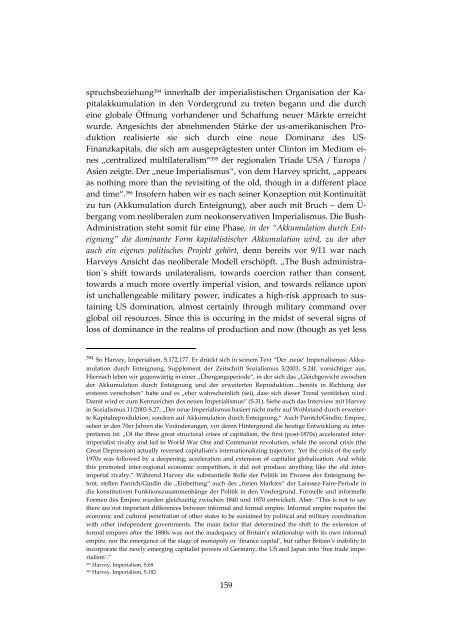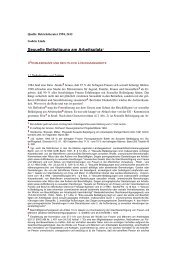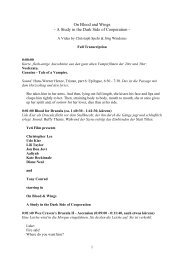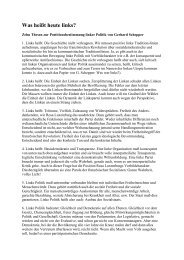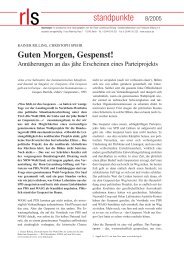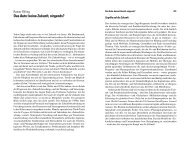outbreak. let's take over. american empire als wille ... - Rainer Rilling
outbreak. let's take over. american empire als wille ... - Rainer Rilling
outbreak. let's take over. american empire als wille ... - Rainer Rilling
Sie wollen auch ein ePaper? Erhöhen Sie die Reichweite Ihrer Titel.
YUMPU macht aus Druck-PDFs automatisch weboptimierte ePaper, die Google liebt.
spruchsbeziehung 394 innerhalb der imperialistischen Organisation der Kapitalakkumulation<br />
in den Vordergrund zu treten begann und die durch<br />
eine globale Öffnung vorhandener und Schaffung neuer Märkte erreicht<br />
wurde. Angesichts der abnehmenden Stärke der us-amerikanischen Produktion<br />
realisierte sie sich durch eine neue Dominanz des US-<br />
Finanzkapit<strong>als</strong>, die sich am ausgeprägtesten unter Clinton im Medium eines<br />
„centralized multilateralism“ 395 der regionalen Triade USA / Europa /<br />
Asien zeigte. Der „neue Imperialismus“, von dem Harvey spricht, „appears<br />
as nothing more than the revisiting of the old, though in a different place<br />
and time“. 396 Insofern haben wir es nach seiner Konzeption mit Kontinuität<br />
zu tun (Akkumulation durch Enteignung), aber auch mit Bruch – dem Ü-<br />
bergang vom neoliberalen zum neokonservativen Imperialismus. Die Bush-<br />
Administration steht somit für eine Phase, in der “Akkumulation durch Enteignung”<br />
die dominante Form kapitalistischer Akkumulation wird, zu der aber<br />
auch ein eigenes politisches Projekt gehört, denn bereits vor 9/11 war nach<br />
Harveys Ansicht das neoliberale Modell erschöpft. „The Bush administration`s<br />
shift towards unilateralism, towards coercion rather than consent,<br />
towards a much more <strong>over</strong>tly imperial vision, and towards reliance upon<br />
ist unchallengeable military power, indicates a high-risk approach to sustaining<br />
US domination, almost certainly through military command <strong>over</strong><br />
global oil resources. Since this is occuring in the midst of several signs of<br />
loss of dominance in the realms of production and now (though as yet less<br />
394 So Harvey, Imperialism, S.172,177. Er drückt sich in seinem Text “Der ‚neue’ Imperialismus: Akkumulation<br />
durch Enteignung, Supplement der Zeitschrift Sozialismus 5/2003, S.24f. vorsichtiger aus.<br />
Hiernach leben wir gegenwärtig in einer „Übergangsperiode“, in der sich das „Gleichgewicht zwischen<br />
der Akkumulation durch Enteignung und der erweiterten Reproduktion…bereits in Richtung der<br />
ersteren verschoben“ habe und es „eher wahrscheinlich (sei), dass sich dieser Trend verstärken wird.<br />
Damit wird er zum Kennzeichen des neuen Imperialismus“ (S.31). Siehe auch das Interview mit Harvey<br />
in Sozialismus 11/2003 S.27: „Der neue Imperialismus basiert nicht mehr auf Wohlstand durch erweiterte<br />
Kapitalreproduktion, sondern auf Akkumulation durch Enteignung.“ Auch Panitch/Gindin, Empire,<br />
sehen in den 70er Jahren die Veränderungen, vor deren Hintergrund die heutige Entwicklung zu interpretieren<br />
ist: „Of the three great structural crises of capitalism, the first (post-1870s) accelerated interimperialist<br />
rivalry and led to World War One and Communist revolution, while the second crisis (the<br />
Great Depression) actually reversed capitalism’s internationalizing trajectory. Yet the crisis of the early<br />
1970s was followed by a deepening, acceleration and extension of capitalist globalization. And while<br />
this promoted inter-regional economic competition, it did not produce anything like the old interimperial<br />
rivalry.” Während Harvey die substantielle Rolle der Politik im Prozess der Enteignung betont,<br />
stellen Panitch/Gindin die „Einbettung“ auch des „freien Marktes“ der Laisssez-Faire-Periode in<br />
die konstitutiven Funktionszusammenhänge der Politik in den Vordergrund. Formelle und informelle<br />
Formen des Empire wurden gleichzeitig zwischen 1840 und 1870 entwickelt. Aber: ”This is not to say<br />
there are not important differences between informal and formal <strong>empire</strong>. Informal <strong>empire</strong> requires the<br />
economic and cultural penetration of other states to be sustained by political and military coordination<br />
with other independent g<strong>over</strong>nments. The main factor that determined the shift to the extension of<br />
formal <strong>empire</strong>s after the 1880s was not the inadequacy of Britain’s relationship with its own informal<br />
<strong>empire</strong>, nor the emergence of the stage of monopoly or ‘finance capital’, but rather Britain’s inability to<br />
incorporate the newly emerging capitalist powers of Germany, the US and Japan into ‘free trade imperialism’.”<br />
395<br />
Harvey, Imperialism, S.68<br />
396<br />
Harvey, Imperialism, S.182<br />
159


